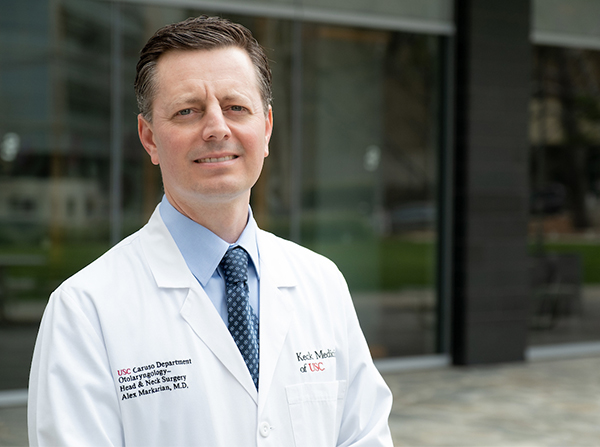Not long ago, a woman with an aggressive cancerous facial tumor that had already claimed half of her nose found her way to Alexander Markarian.
Alexander Markarian, MD, who is a clinical assistant professor of otolaryngology – head and neck surgery at the Keck School of Medicine of USC and director of the facial plastic and reconstructive surgery division at Keck Medicine of USC, went to work.
“I reconstructed her,” Markarian says. “She looks good, and she’s now living a normal life. She still needs radiation, but she has a nose and is able to function in her normal daily activities.”
Markarian recently also treated a woman with an acoustic neuroma that resulted in facial paralysis. “We were able to do nerve grafting to help her regain some functions,” he explains. “Both the surgery and the rehabilitation were highly successful.”
The common thread in these cases, as with so many others that Markarian treats, is an unwavering focus on patient outcomes. “My role, basically, is to treat complex disease in a meaningful manner, changing people’s lives in a positive direction, restoring form and function and some sort of normalcy.”
While this may sound straightforward and simple, these achievements are remarkably hard to accomplish. Apart from the clinical intricacies inherent in facial reconstruction, there are, for patients, distinct emotional and aesthetic elements in play that only add to the challenge. And that challenge, as it turns out, is why Markarian does what he does.
“During medical school, this was the most difficult anatomy to learn — and the difficulty drew me to it,” he recalls. “I was able to find a mentor, which was very important for my decision to specialize, someone who helped draw me into the patient care side of things — how to treat patients with compassion and intellect and surgical skill.”
Today, Markarian often leads multidisciplinary teams; in facial reconstruction cases, it takes a village of specialists. “For cancer reconstruction, we have an entire head-and-neck cancer service,” he says. “We have cancer surgeons, radiation oncologists, medical oncologists, speech and language pathologists, and mid-level providers, all working in concert on the patient’s behalf, with a holistic perspective. For skin cancer, I work closely with our dermatology colleagues and our nose surgeon. We typically have a tumor board conference, where we’ll discuss cases and plan Mohs surgery — a precise micrographic surgical technique used to treat skin cancer — and reconstruction, if necessary, in a coordinated manner. For facial paralysis, we have our neuro-otology colleagues, our neurosurgeons and our physical therapists that focus on facial nerve retraining. Truly, collaboration is everything.”
Integrating skills and disciplines will become even more critical, as new treatments for scarless wound healing and facial paralysis advance. “We’re nearing a tipping point around the use of stem cells, and our ability to guide the body to regenerate or heal itself,” Markarian says. “It’s very promising, and I’m excited. Barriers remain, and for all we’ve learned, it will still take some time. We’ll need to do translational research, so we can begin to start applying what we know to actual patients.”
Longer term goals include endowing Markarian’s position and creating a named chair, as well as developing a formal center that encompasses all of his, and his team’s, work. “A center would provide us with the freedom to guide research into areas where we feel it would be most beneficial and to invest in certain aspects of research that otherwise wouldn’t be amenable to public funding,” he says.
Markarian’s “can-do” attitude has long characterized his approach to patient care, clinical research and educational endeavors. “Maintaining a balance among the three — clinical practice, research and teaching — is difficult, but striving for that balance is the best way I know to advance science and medicine,” he says.
And for Markarian, difficulty is rarely a deterrent.
To make a gift to the USC Tina and Rick Caruso Department of Otolaryngology – Head and Neck Surgery, click here.
